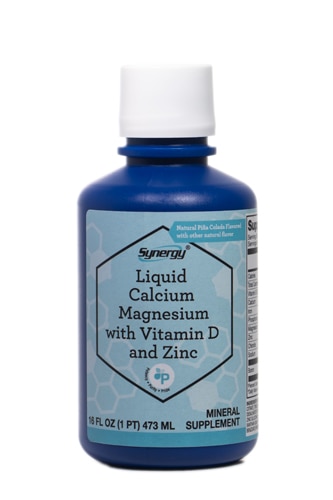[vc_row][vc_column][vc_column_text]The internet is notorious for conflicting points of view and fraudulent information, and nowhere is this more dangerous than in the realm of wellness. If you’re like the majority of us, you turn to Google to pose health questions; and while some sites are carefully vetted to ensure readers walk away with valuable data, there are just as many “publications” that feature bogus info—or fail to provide users with the full picture.

Case in point, at least when it comes to the latter: In recent months, publications ranging from
Forbes to CNN have featured headlines regarding
vitamin D. For those who conducted only cursory research on the matter, it may seem that they should toss out their vitamin D supplements or delete the bottle in their online shopping cart.
The recent news on vitamin D surrounds a recent study published by the
New England Journal of Medicine, which found that high levels of vitamin D without calcium do not protect middle-aged and older individuals against bone fractures. However, the study didn’t take into account people with low-bone density, osteoporosis and/or a vitamin D deficiency, nor patients in nursing home facilities, effectively leaving out a significant portion of our population
and those who need it most. Moreover? News outlets peered at only
one aspect of vitamin D’s value to the human body.
Before you stop taking vitamin D based on a headline, remember that vitamin D is essential to your well-being. Here’s why you shouldn’t abandon vitamin D—and how to bring more of it into your life.
What is vitamin D?
First things first: Vitamin D is a fat-soluble vitamin that, despite what the news might imply, is fundamental to bone health. Why? Because we cannot absorb calcium
unless vitamin D is present—and we all know that calcium is the building block of bones.
Vitamin D, which also acts as a hormone, plays an imperative role in several other physical functions, including cognition, muscle function, mood and immune health. And while we naturally produce vitamin D when our skin is exposed to direct sunlight, reduced time outdoors, the use of sunscreen, seasonal changes and the location in which some live have resulted in below-par vitamin D levels of almost epidemic proportions: According to the Cleveland Clinic, roughly
half of the global population has a vitamin D deficiency. In the U.S. alone, 35% of adults don’t consume enough of it.
Alarming? No doubt. Here’s why.
Why is vitamin D important?
The benefits (and necessities) of vitamin D are far-reaching. Here are just a few of its potential advantages:
Supports immune health†
The strength of your immune system has probably been on the forefront of your mind since the onset of the pandemic. For a good reason, too: As your body’s first line of defense against foreign invaders, the state of your immune system is often the deciding factor between illness and wellness.
Vitamin D is crucial to ensuring your immune system functions at its peak by organically supporting a healthy immune response.
†
Vitamin D is crucial to ensuring your immune system functions at its peak. It plays a part in supporting the production of antimicrobial peptides (AMPs) and
helps moderate T cells, which organically supports a healthy immune response.
†
Supports a healthy mood†
When we’re struck with a low mood—either briefly or for an extended period—we have a tendency to assign blame to external factors. It’s certainly true that everything from a difficult job to interpersonal conflict can contribute, if not provoke, a case of the blues, but it’s just as vital to assess your health and
nutrition.
Vitamin D may help in this regard. Recent research published in the scientific journal
Cureus concludes that citamin D supports a more balanced mood.
† Meanwhile, the connection between vitamin D and clinical depression is exceedingly complex; researchers are still trying to understand if low vitamin D levels
cause depression or if depression leads to low vitamin D levels as a result of spending less time outdoors and/or following a poor diet, among other factors.
† Either way, all of this underscores the importance of keeping tabs on your vitamin D intake and savoring fresh air on a daily basis.
Supports muscle recovery†
Phosphate plays a central role in muscle contractions, and vitamin D helps to ensure the mineral is adequately absorbed. In fact, studies indicate that 30% of phosphate absorption in your intestines relies on vitamin D.
†
Supports cognitive function†
Recall, focus and the capacity to learn new concepts are all impacted by vitamin D, which has been shown to possess neuroprotective properties.
† Vitamin D also works towards combatting oxidative stress—a condition that has been linked to a host of health concerns.
†
The jury is still out on whether vitamin D can help protect against the development of neurogenerative diseases. In the meantime, reaching for foods that are rich in vitamin D, supplementing to fill in nutritional gaps, and getting adequate amounts of sleep, water and exercise may encourage clearer thinking, period.
Supports skin health†
On the prowl for a more radiant complexion? Consider eating more foods fortified with vitamin D or taking a vitamin D supplement. Vitamin D’s immune-supporting capabilities may help encourage skin wellness by promoting a healthy inflammatory response, while also potentially enhancing hydration.
How much vitamin D do I need?
The Institute of Medicine recommends 600 IU daily for adults up to the age of 70; folks 71 and older should have 800 IU per day. However, everyone’s needs are unique. Your best bet is to consult with a healthcare professional before supplementing with vitamin D and deciding on a dosage.
How can I increase my Vitamin D intake?
Fifteen minutes of unprotected exposure to sunlight (specifically, UVB) three or so times a week is the savviest way to synthesize (and “receive”) vitamin D. What should you do when winter strikes? Pile your plate with vitamin D-rich eats, of course.
Salmon, trout, tuna, vitamin D-fortified milk and cereals—all are excellent sources of this essential nutrient, and there’s not a single journalist around would could argue with
that.
†These statements have not been approved by the Food and Drug Administration. These products are not intended to diagnose, treat, cure or prevent disease.
[/vc_column_text][/vc_column][/vc_row][vc_row][vc_column][vc_text_separator title="Featured Products" border_width="2"][vc_row_inner equal_height="yes" content_placement="middle" gap="35"][vc_column_inner width="1/3"][vc_single_image image="163790" img_size="full" alignment="center" onclick="custom_link" img_link_target="_blank" css=".vc_custom_1670515118338{padding-right: 7% !important;padding-left: 7% !important;}" link="https://www.vitacost.com/zahler-vitamin-d3-1000-iu-120-softgels-1"][/vc_column_inner][vc_column_inner width="1/3"][vc_single_image image="163789" img_size="full" alignment="center" onclick="custom_link" img_link_target="_blank" css=".vc_custom_1670515174949{padding-right: 7% !important;padding-left: 7% !important;}" link="https://www.vitacost.com/vitacost-vitamin-d3-as-cholecalciferol-25-mcg-1000-iu-300-capsules"][/vc_column_inner][vc_column_inner width="1/3"][vc_single_image image="163788" img_size="full" alignment="center" onclick="custom_link" img_link_target="_blank" css=".vc_custom_1670515192179{padding-right: 7% !important;padding-left: 7% !important;}" link="https://www.vitacost.com/mrm-vegan-vitamin-d3-2500-iu-60-vegan-capsules-2"][/vc_column_inner][/vc_row_inner][/vc_column][/vc_row]
 Case in point, at least when it comes to the latter: In recent months, publications ranging from Forbes to CNN have featured headlines regarding vitamin D. For those who conducted only cursory research on the matter, it may seem that they should toss out their vitamin D supplements or delete the bottle in their online shopping cart.
The recent news on vitamin D surrounds a recent study published by the New England Journal of Medicine, which found that high levels of vitamin D without calcium do not protect middle-aged and older individuals against bone fractures. However, the study didn’t take into account people with low-bone density, osteoporosis and/or a vitamin D deficiency, nor patients in nursing home facilities, effectively leaving out a significant portion of our population and those who need it most. Moreover? News outlets peered at only one aspect of vitamin D’s value to the human body.
Before you stop taking vitamin D based on a headline, remember that vitamin D is essential to your well-being. Here’s why you shouldn’t abandon vitamin D—and how to bring more of it into your life.
Case in point, at least when it comes to the latter: In recent months, publications ranging from Forbes to CNN have featured headlines regarding vitamin D. For those who conducted only cursory research on the matter, it may seem that they should toss out their vitamin D supplements or delete the bottle in their online shopping cart.
The recent news on vitamin D surrounds a recent study published by the New England Journal of Medicine, which found that high levels of vitamin D without calcium do not protect middle-aged and older individuals against bone fractures. However, the study didn’t take into account people with low-bone density, osteoporosis and/or a vitamin D deficiency, nor patients in nursing home facilities, effectively leaving out a significant portion of our population and those who need it most. Moreover? News outlets peered at only one aspect of vitamin D’s value to the human body.
Before you stop taking vitamin D based on a headline, remember that vitamin D is essential to your well-being. Here’s why you shouldn’t abandon vitamin D—and how to bring more of it into your life.



